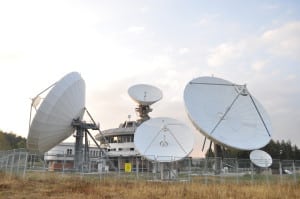Nurts Bulgaria Examines International Broadcast Opportunities
[Via Satellite 03-18-2016] After playing a pivotal role in Bulgaria’s transition from analog to digital television in 2013, Nurts Bulgaria is planning to increase its satellite broadcasting capabilities far beyond its domestic market. Today, Nurts uplinks 170 channels from its Teleport Plana, located near Bulgaria’s capital city, Sofia. Television channels account for 125 of that number, including the Vivacom Direct-to-Home (DTH) package, with the remaining 45 comprised of radio channels. Vladimir Rangelov, commercial director of Nurts Bulgaria, told Via Satellite the company has been adding capacity to now grow more internationally.
“Our main [Multi-Channels Per Carrier] MCPC position for Bulgaria and the region is on Intelsat 45E, where more than 300 TV operators in 10 countries receive TV signals for contribution. As of this year, we also uplink TV channels via the Eutelsat satellite fleet for the whole continent of Europe, and from 2013 on Turksat 42E for Turkey. Nurts plans to create a new MCPC video contribution platform together with Eutelsat, covering the whole continent of Europe and a part of Asia. We are in the process of negotiations with international content providers for the new MCPC,” he said.
Rangelov was the project manager for Vivacom DTH TV in 2010, a service that launched in six months and grew to become the second largest pay-TV platform in Bulgaria today. He said Nurts satellite contribution service has grown to 70 percent market share in the country, which has a population of approximately 7.2 million according to the World Bank, over the past four years.
“The number of channels broadcasted via our platform is constantly increasing, as well as the number of countries and operators receiving signals from our platform. Our visibility arc is 40 degrees west to 90 degrees east with possibility to work on popular satellite positions for Europe, Africa, Middle East and Asia where we plan to extend our reach,” said Rangelov.
Nurts customers include Fox International Channels, CME, Bulgarian National Radio, Bulgarian National Television, Comminicorp, Overon, and several other content providers and telecom operators. The company has worked with Intelsat for 22 years, with SES for three, and it recently began working with Eutelsat. Rangelov said Nurts is planning to increase its service portfolio, and is constantly negotiating new channels for contribution on its platforms.
He added that Nurts has invested more than 5 million euros, ($5.7 million) over the past few years in Teleport Plana, procuring ground infrastructure and equipment from satellite communications and signal processing vendors. The company also invests significantly in human resources development, he said. Two months ago, Teleport Plana received approval from Eutelsat for the operator’s third party teleport program. Nurts is also a member of the World Teleport Association (WTA).
Rangelov said satellite technology remains crucial for television distribution in areas with a lack of fiber optic connectivity, and is the best solution for contributing TV signals to head ends in large territories. He did note a growing popularity of Internet Protocol Television (IPTV) and Over-The-Top (OTT) distribution methods. Rangelov said migration to OTT and non-linear services will be an increasing trend over the next few years, as will IPTV, though Nurts sees IPTV and DTH combinations as an advantage in providing national coverage and quick market response.
Regarding video resolution and format, Rangelov said there is a general trend up from SD that could lead into Ultra-HD by the end of the decade.
“There is a constant slight increase in the number of HD programs in Bulgaria, but the most popular format is still SD. My expectations are that 4K Ultra-HD most probably will enter the market in the next three to five years, as there is still not enough 4K content and not very many TV sets support the Ultra-HD technology,” he said.
Bulgaria is soon to have its own satellite through DTH player Bulsatcom, which will influence the competitive landscape for Nurts. SSL is manufacturing the satellite, named BulgariaSat 1, for Bulsatcom’s affiliate Bulgaria Sat, having signed the manufacturing contract in September 2014. SpaceX is scheduled to launch the satellite on a Falcon 9 rocket. Rangelov said he expects Bulsatcom will provide more SD and HD channels with the new satellite, but also anticipates his competitor will face challenges due to the difference in satellite position between BulgariaSat 1 and the foreign spacecraft the company uses today. He added that there is a large supply of capacity covering Bulgaria and the region today, which is driving prices down.
